Publication of English and Azeri books by AhlulBayt (a.s.) World Assembly
One of the activities of the AhlulBayt (a.s.) World Assembly is the translation of authentic books into various languages. In this article we introduce some of these books.
One of the activities of the AhlulBayt (a.s.) World Assembly is the translation of authentic books into various languages. In this article we introduce some of these books.
“The Role of Imams (a.s.) in Reviving Religion”/ Azeri
In this book, the author examines the principles governing the practice of the Infallible Imams (a.s.) in reviving true Islam and protecting the tradition of the Prophet Muhamad (p.b.u.h). This book is the result of a series of lectures by the author on the subject, which is organized in the form of forty-four lessons. In this book, the author has tried to look meticulously at the following topics and issues with the method of analytical biography: introduction and comparison of the school of caliphs and AhlulBayt (a.s.), explanation of some Islamic terms, a brief overview of the tradition of the Prophet Muhammad (p.b.u.h) and its situation during the caliphs, correction of religious beliefs about knowing Imams (a.s.), a description of the history of Islamic thought in past centuries and the expression of making distortions and hadiths, expressing false virtues and actions of the hypocritical enemies of Islam and Shiism. According to him, the greatest role of Shiite Imams has been to protect the Islam from distortion and to tell the truth to the Islamic Ummah.
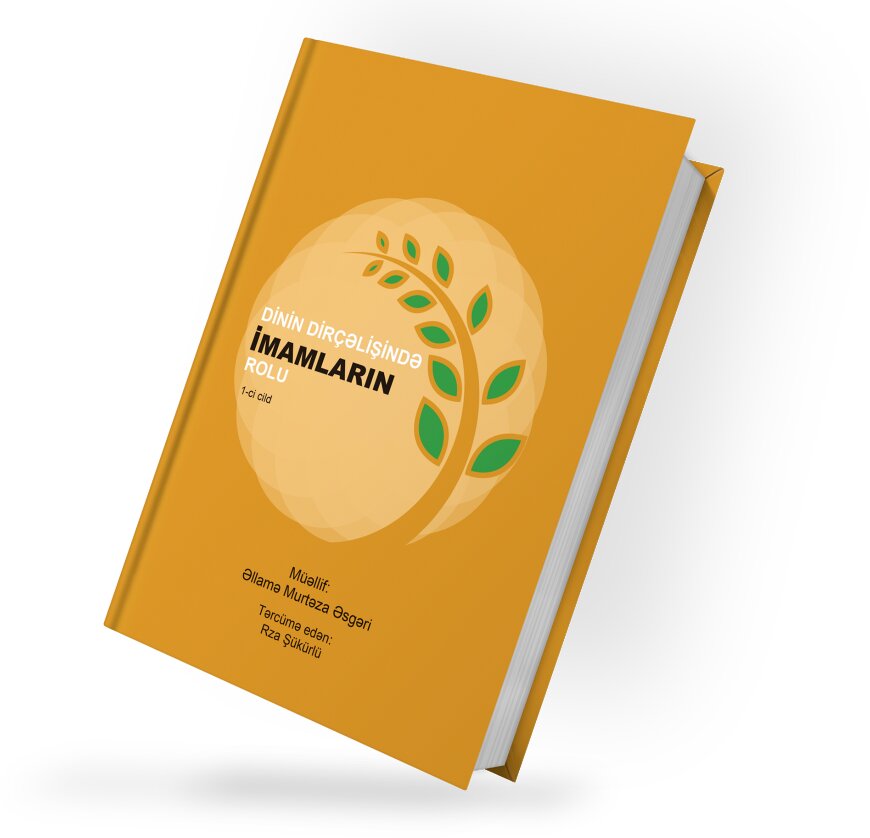
The book “The Role of Imams (a.s.) in Reviving Religion” by Allameh Sayed Morteza Askari (r.a.), is translated by Mr. Reza Şükrəf into Azeri in 493 pages and single volume. The AhlulBayt (a.s.) World Assembly Publications has published this book in medium octavo size and made it available to those who are interested.
“Charter of Statesmanship by Imam Ali (a.s.)”/ English
This book is a description and explanation on the Imam Ali (a.s.) command to Malik Ashtar. This command was given to Malik Ashtar by Imam Ali (a.s.) when Malik was dispatched to take the rule of Egypt and contains recommendations and instructions for Islamic governance. The author intends to carefully explain the Islamic view in the field of government and governance in the various passages of this letter. At the beginning of the book, there are articles about the author. Then there are discussions about the character of Malik Ashtar, and the importance of the Egyptian government in the beginning of Islam. Then, the different phrases of the command, one by one, are discussed and the necessary explanations are provided about them. The different parts of the book emphasized the observance of piety, the need to pay attention to Islamic ethics and teachings for the ruler, the observance of fairness and justice in dealing with the people, the importance of fighting oppression, advice to the government and expressing the methods of managing state and military forces.
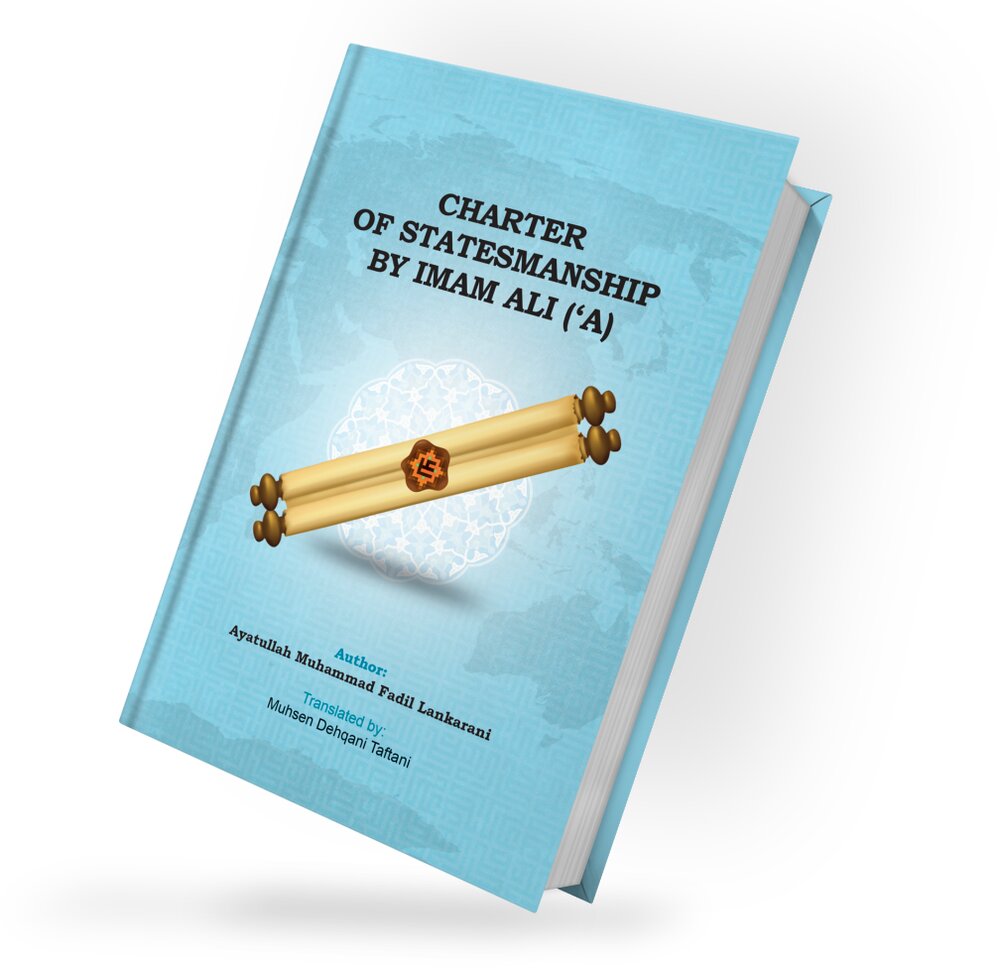
The book “Charter of Statesmanship by Imam Ali (a.s.)” by Ayatollah Mohammad Fazel Lankarani (r.a.), has been translated by Mr. Mohsen Dehghani Taftani in English in one volume and 220 pages. The AhlulBayt (a.s.) World Assembly Publications has published this book in crown octavo and made it available to those who are interested.
“The Verse of Purification”/ English
This book is an analysis of historical events after the demise of the Prophet Muhammad (p.b.u.h) based on the Verse of Purification. The author has considered the 33rd verse of Surah Al-Ahzab as the most important document for judging many Islamic intellectual and cultural issues. According to him, by referring to this noble verse and scrutinizing it, one can recognize the main line of thought of Islam in its principles and sub-principles. By studying the Prophetic tradition and some other verses of the Quran, such as the Verse of Ikmal al-Din (Q5:3), he has thematically studied the AhlulBayt (a.s.), and has raised the following as a result of his discussions: Indisputable Caliphate and Imamate of Imam Ali (a.s.), Continuation of Imamate in Infallible Imams (a.s.), and the authenticity of the hadiths of those nobles. In the end, he has studied the Verse of Purification in the books of Kutub Sehah al-Sittah, Musnads and Sunni Tafsir books.

The book “Verse of Purification” is written by late Ayatollah Mohammad Mahdi Asefi (r.a.) and has been translated by Mr. Abdullah Ahmad Zango in English in one volume and 204 pages. The AhlulBayt (a.s.) World Assembly Publications has published the book in medium crown size and made it available to those who are interested.
“An Acquaintance with Islam”/ English
This book, which has been written with the motive of brief introduction of Islamic beliefs in various fields, using Quranic teachings and narration, provides explanations for topics such as: Islamic Principles (Osul al-Din), Ethics in the view of Islam, Faith and man from the perspective of Islam, Duties (Taklif) and rulings (Ahkam) and their sources, and finally, the sub-principles of Islam (Foru al-Din). In the light of these issues, the author refers to and explains topics such as: The role of beliefs in human felicity, The position of the Velayat in Islam, Ethical methods, Prayer and worship in Islam, Infidelity (Kufr) and hypocrisy (Nifq), Unity (Wahdah), Free will and Determinism, Human responsibilities, Prayer, Fasting, Hajj, Jihad, Enjoining the good and forbidding the evil, Zakat and Khums.

The book “An Acquaintance with Islam” is written by late Ayatollah Ebrahim Amini (r.a.) and has been translated by Mr. Mahmoud Farokhpey in English in one volume and 244 pages. The AhlulBayt (a.s.) World Assembly Publications has published the book in crown octavo size and made it available to those who are interested.
“Arbaeen”/ English
In the book, after a brief introduction, the author examines topics such as: The place and use of the number 40 in religious culture and texts, Dedicating Arbaeen pilgrimage to Imam Hussain (a.s.), Arbaeen pilgrimage, a sign of being a believer, Captives of Karbala, Arbaeen pilgrimage throughout history, Topics related to Arbaeen in contemporary Iran, The importance of the pilgrimage of Imam Hussain (a.s.) in the words of the Infallibles (a.s.), and Philosophy of pilgrimage, etc.

The book “Arbaeen” is written by Mr. Ali Dejakam and has been translated by Mr. Mansour Limba and Ms. Gil Dayan in English in one volume and 144 pages. The AhlulBayt (a.s.) World Assembly Publications has published the book in crown octavo size and made it available to those who are interested.
“The Appropriate Way to Await the Twelfth Imam”/ English
This book has a look at the semantics of the word Awaiting in the Quranic verses and the hadiths of the Infallibles (a.s.). It begins with a narrative and historical look at the concept of Awaiting. Then, by proposing types of Awaiting, the author praises an Awaiting that causes one to strive to achieve a goal. He does not consider an Awaiting that only gives hope and desire, and does not lead to move, a religious Awaiting. In the following, he examines and analyzes the various reasons that delay the Reappearance (of Imam Mahdi a.s.). Then, the various groups mentioned in the hadiths as the people who pave the way for the Reappearance will be introduced. In the concluding section of his book, the author states that there is a close connection between effort and the issue of Awaiting; in such a way that each causes an increase in the other.

The book “The Appropriate Way to Await the Twelfth Imam” is written by late Ayatollah Mohammad Mahdi Asefi (r.a.) and has been translated by Mr. Shiraz Hossein Agha in English in one volume and 144 pages. The AhlulBayt (a.s.) World Assembly Publications has published the book in crown octavo size and made it available to those who are interested.
“A Study of the Fundamental Themes of Imamate”/ English
This book has four chapters in which the necessity of existence, conditions, attributes, and quality of choosing an Imam are examined: In the first chapter, issues such as: the definition of Imamate, the origin of Shiism, Imamate in the Quran, Ulol al-Amr, and the Wali al-Amr, in Hadiths are examined. In the second chapter, the specific prophecy argument (Borhan al-Nobowah al-Khasah), and the rational and narrative reasons of Imamate are discussed. In the third chapter, the reasons for the Imam’s infallibility from the points of views of intellect, hadith, and the Quran (study of the verse of purification) have been scrutinized. In the fourth chapter, the subject of Imam’s knowledge is explored, in which the following topics are examined: knowledge of the Ahkam, sources of knowledge of Imams (a.s.), difference between Imam and Prophet, knowledge of the unseen, news of Imams (a.s.) of the unseen, limits of knowledge of the unseen, the miracle, the superiority of the Imam, and the way he was chosen.

The book “A Study of the Fundamental Themes of Imamate” is written by late Ayatollah Ebrahim Amini (r.a.) and has been translated by Mr. Kelvin Lembani in English in one volume and 413 pages. The AhlulBayt (a.s.) World Assembly Publications has published the book in crown octavo size and made it available to those who are interested.
“A Short Treatise on the Life of Imam Ali (a.s.)”/ English
The book tries to introduce the personality of Imam Ali (a.s.) by examining the views of this Imam (a.s.) on topics such as politics, jihad, mysticism, and death. According to the author, the study of the personality of Imam Ali (a.s.) should be based on understanding the roots of thought and the real motives of that Imam. He considered Imam Ali (a.s.) as a politician who believed that securing the interests of society and the interests of individuals is feasible through the spread of Islamic knowledge, and always tried to rule obedience to God and the observance of human values in all aspects of his personal and social life. The author also criticizes the attitude of some Islamic scholars and Western Islamologists to the mentioned issues and intends to provide a clearer picture of Imam Ali’s (a.s.) thought. Also, in an article in this book, the validity of citing Nahj al-Balagha to the words of Imam Ali (a.s.) is discussed.

The book “A Short Treatise on the Life of Imam Ali (a.s.)” is written by late Allameh Mohammad Taqi Jafari (r.a.) and has been translated by Mr. Kazem Bujani in English in one volume and 138 pages. The AhlulBayt (a.s.) World Assembly Publications has published the book in crown octavo size and made it available to those who are interested.
“Fragrances, A biography of the Imams of the AhlulBayt (a.s.)”/ English
The book describes some of the attributes and virtues of the Infallible Imams (a.s.). In each of the twelve chapters of the book, the author has examined the personal characteristics, moral virtues, and social life of one of the Imams (a.s.). The author describes those nobles as exemplary and unique human beings and considers all of them to have the attributes of selflessness, self-sacrifice, asceticism, humility, helping the poor and weak in society, and disseminating sciences and knowledge. The birth, titles, moral virtues, social services, wise words, and the manner of martyrdom of each of the Imams (a.s.) are also stated in this book. The author has presented the chapter related to Imam Ali (a.s.) in detail, and in it, he mentions the era of Imamate of Imam Ali (a.s.), his position with the Prophet Muhammad (p.b.u.h), his status in the Resurrection, and his positive effects on progress of the mission of Prophet Muhammad (p.b.u.h).

The book “Fragrances, A biography of the Imams of the AhlulBayt (a.s.)” is written by late Allameh Baqer Sharif Al-Qarashi (r.a.) and has been translated by Mr. Abdullah Ahmad Zango in English in one volume and 374 pages. The AhlulBayt (a.s.) World Assembly Publications has published the book in crown octavo size and made it available to those who are interested.
“The Saqifah Conspiracy”/ English
In his book, the author analyzes and explains the Muslim dispute over the succession of the Prophet Muhammad (p.b.u.h) after his demise, and briefly reviews the events of the beginning of Islam. In this book, the general atmosphere of the origin of Islam among the Quraysh tribe, Hejaz region, is first described, and the main enemies of Islam are introduced. The position of the Caliphate in Islam is the first issue that the author has addressed, and he has considered the Caliphate as one of the necessities of Islam and emphasized by the Prophet Muhammad (p.b.u.h). Also in this section, the author has discussed the issue of appointing Imam Ali (a.s.) as a successor by the Prophet Muhammad (p.b.u.h). Next, the book examined the caliphate in the Quran and Sunnah. The great support of the Prophet Muhammad (p.b.u.h) about the succession of Imam Ali (a.s.), and the confrontation with the dangers that will befall the Islamic Ummah in the society after his demise, and references to the last days of the life of the Prophet Muhammad (p.b.u.h) are the next contents of the book. The book concludes with a detailed account of the Saqifah incident and examines the role and performance of proponents and opponents, as well as a look at its consequences.
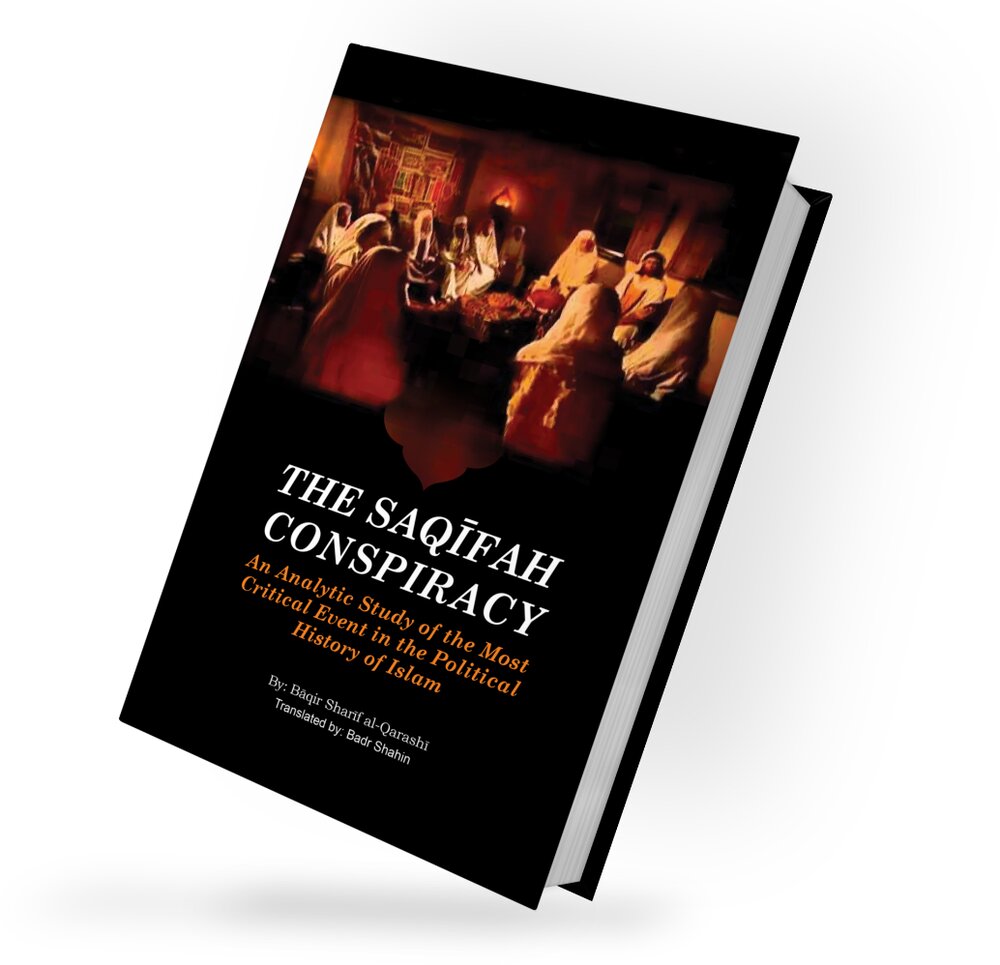
The book “The Saqifah Conspiracy” is written by late Allameh Baqer Sharif Al-Qarashi (r.a.) and has been translated by Mr. Badr Shahin in English in one volume and 240 pages. The AhlulBayt (a.s.) World Assembly Publications has published the book in medium octavo size and made it available to those who are interested.
“The Sun Rises in the West”/ English
The book contains notes about Imam Mahdi (a.s.) and examines the various dimensions and aspects of his Occultation. In this research, the author intends to express the lofty ideals in conveying religious truths, promoting proper education and establishing justice in all aspects of society. The book begins with a description of the birth and life of Imam Mahdi (a.s.). In the following, the issue of his Occultation is the focus of the discussion. In several chapters of the book, the truth of occultation in Islam and its background in other religions, and its implication according to the Quran, rational sciences and experimental sciences have been evaluated. Then, in a separate chapter, the educational and political philosophy of Islam is explored and components such as education, politics and guidance are considered as its main elements, and their relationship with the Occultation of the Imam is scrutinized. In the final part, the subject of Awaiting is discussed, and in it, the author tries to explain the duties of those who Await Imam Madi (a.s.).
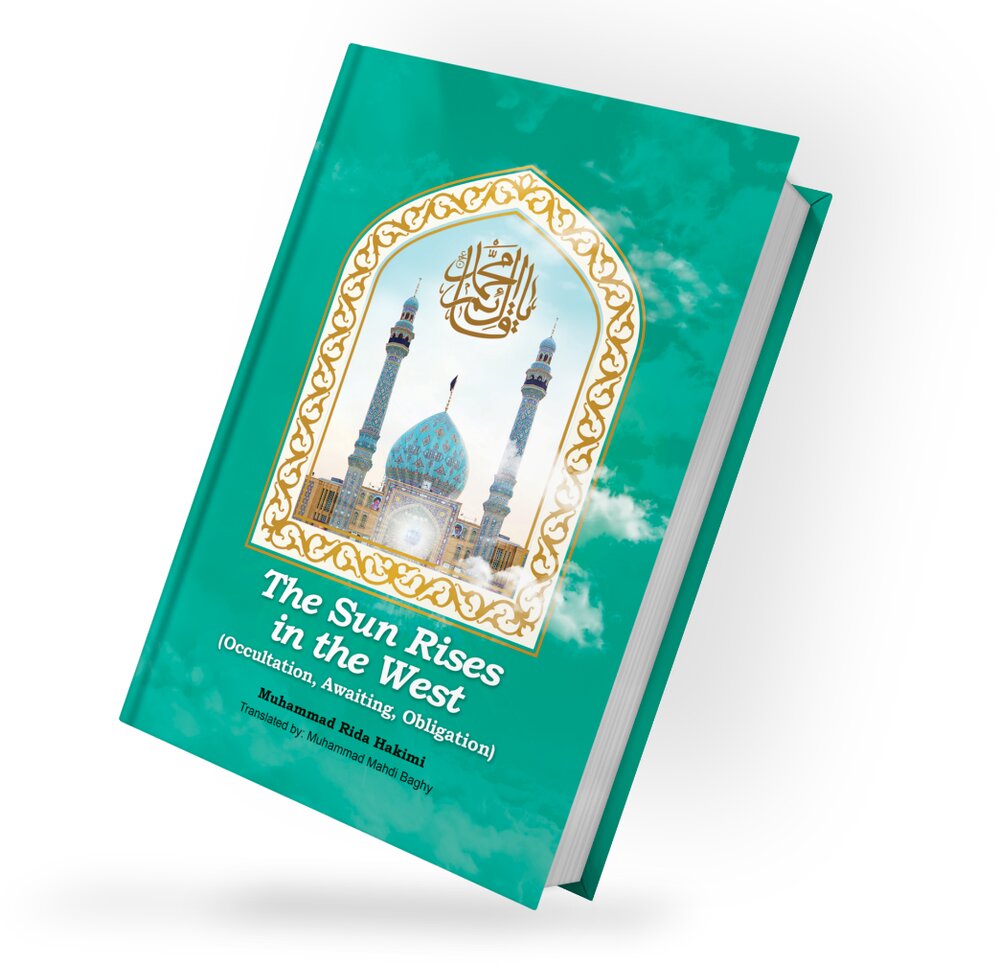
The book “The Sun Rises in the West” is written by late Allameh Mohammad Reza Hakimi (r.a.) and has been translated by Mr. Mohammad Mahdi Baqi in English in one volume and 340 pages. The AhlulBayt (a.s.) World Assembly Publications has published the book in medium octavo size and made it available to those who are interested.
“The Expected Mahdi (a.s.)”/ English
The book, which is a study on the Mahdism Thought, has three general sections. The first part has three chapters and deals with the subject of recognizing Imam Mahdi (a.s.) and examining his characteristics. In this section, it is stated that understanding Imamate depends on understanding Nabowat (prophethood) and understanding Nabowat depends on understanding the truth of Tawhid (monotheism). Other topics in this section include explaining the true meaning of knowing the Imam, introducing the way of knowing the Imam Mahdi (a.s.), and identifying him as a perfect human being, and the caliph of God. The second part examines the issue of Awaiting and explains the truth of Awaiting and the duty of those who Await in four separate chapters. The third part, in two chapters, deals with the necessity of the Reappearance of Imam Mahdi (a.s.) and the general atmosphere of the world after his Reappearance, as well as the establishment of a Mahdavi utopia and the expression of its characteristics.

The book “The Expected Mahdi (a.s.)” is written by Ayatollah Javadi Amoli and has been translated by Mr. Mohmoud Farokhpey in English in one volume and 206 pages. The AhlulBayt (a.s.) World Assembly Publications has published the book in medium octavo size and made it available to those who are interested.
“Imam Ali ibn Abi Talib, the Successor of the Prophet”/ English
The book has an analytical review on the life history of Imam Ali (a.s.). From the author’s point of view, the different periods of the life of that great Imam are five significant periods, which are: from birth to the beginning of the prophethood of the Prophet Muhammad (p.b.u.h), from the beginning of the prophethood to Hijra (migration), from the migration to the demise of the Prophet Muhammad (p.b.u.h), from the demise of the Prophet (p.b.u.h) to the caliphate, and finally from the caliphate to martyrdom. The author acknowledges that in his book, he did not decide to introduce the personal character of Imam Ali (a.s.), but his main concern was to study the important events in the life of this Imam. The fifth and sixth parts of the work, which are the main parts of its topics, are dedicated to explaining the causes and factors of the events of the Imam Ali’s (a.s.) caliphate era, including: fighting seditions and coups, opponent social groups, establishing of the Umayyad government, wars, confronting some rebellious companions, governance, and martyrdom.

The book “Imam Ali ibn Abi Talib, the Successor of the Prophet” is written by Ayatollah Jafar Sobhani and has been translated by Mr. Sayed Hossein Alamdar in English in one volume and 504 pages. The AhlulBayt (a.s.) World Assembly Publications has published the book in medium octavo size and made it available to those who are interested.
“Virtues of the Five Persons, collected from, the Six Reliable Books”/ English
The book describes some of the virtues of the five people of Ahl al-Kisa. In this collection, with pondering six authentic Sunni hadith sources, the author has tried to present a clear picture of different angles and wide dimensions of spiritual positions, individual and social life, morals, and virtues of the Prophet Muhammad (p.b.u.h), Ali, Fatima, Hassan, and Hussain (a.s.) to his audience. During his discussions, he focuses on the virtues of those unique figures or their attributes, and explores various Sunni hadith sources about it, and points to their numerous examples and narrated differences. In the first part, the author describes the Prophet Muhammad (p.b.u.h) and Imam Ali (a.s.), and in the next part, the high position of Imam Ali (a.s.) in the eyes of the Prophet (p.b.u.h), and in the final part, he expressed the virtues of other five people of Ahl al-Kisa.
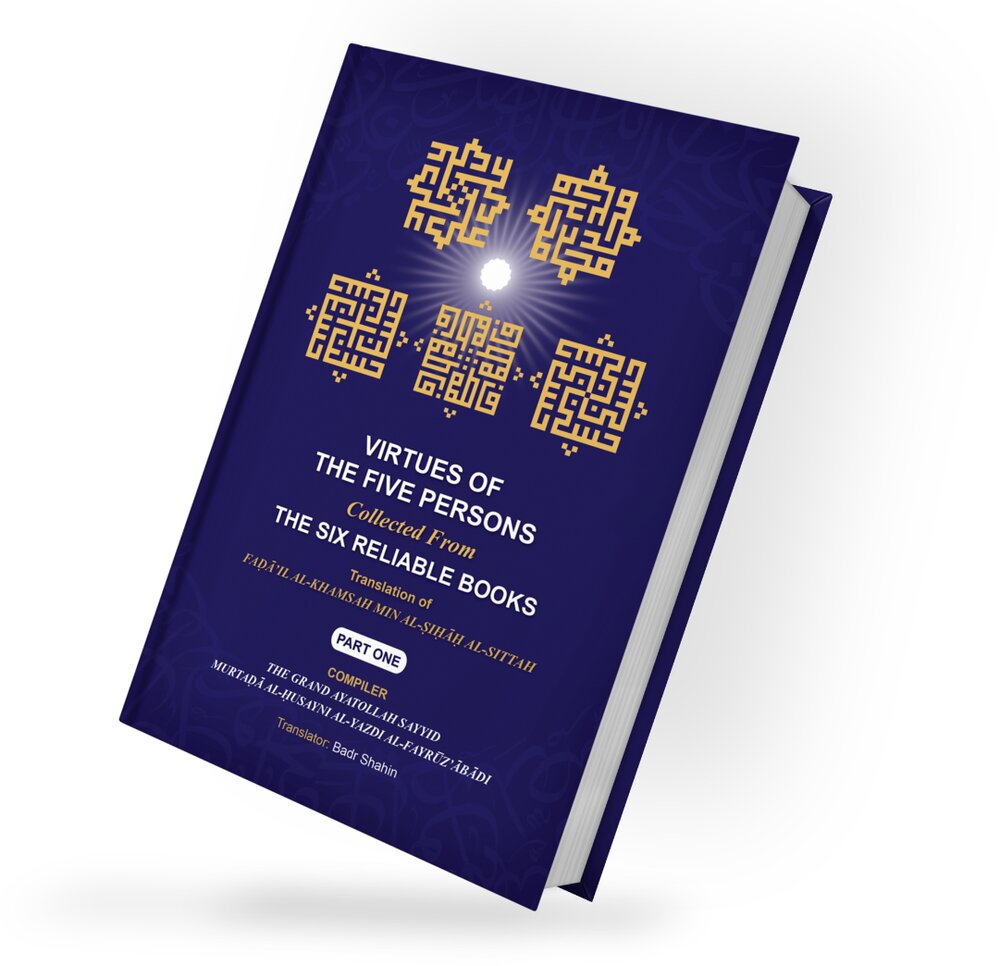
The book “Virtues of the Five Persons, collected from, the Six Reliable Books” is written by Mr. Morteza Hosseini Yazdi Firousabadi, and has been translated by Mr. Badr Shahin in English in one volume and 523 pages. The AhlulBayt (a.s.) World Assembly Publications has published the book in medium octavo size and made it available to those who are interested.
“Paradoxes of Whhabism”/ English
This book has criticized the ideas and thoughts of Wahhabism and responds to the suspicions raised by them against the Shiites. The author has tried to explain the Islamic point of view with a Quranic and hadithic approach in cases that contradict the beliefs and ideas of Wahhabism and other Islamic denominations. To achieve this goal, he has organized the contents of the book into two general sections. In the first part, the issue of Tawhid (monotheism) and Shirk (polytheism) is the basis of the discussion. In addition, it has dealt with issues such as: types of Tawhid and Shirk, the importance of Tawhid in worship, permission to go on pilgrimage of the shrine of the Prophet Muhammad (p.b.u.h) and travel for this pilgrimage, permission to go on the pilgrimage of the graves of believers even for women, permission to hold celebrations and mourning for great Islamic figures. In the second part, the subject of distortion of the Quran has been the focus of discussions and in it, the meaning of distortion, its types, explaining the views of Shiite and Sunni figures about it and some reasons to reject the idea of distortion of the Quran are given.

The book “Paradoxes of Whhabism” is written by late Ayatollah Taheri Khorramabadi (r.a.) and has been translated by Zeinab Mohammadi Araqi in English in one volume and 453 pages. The AhlulBayt (a.s.) World Assembly Publications has published the book in medium octavo size and made it available to those who are interested.
“Imam Hussain’s (a.s.) Revolution”/ English
The book has described and analyzed the movement of Imam Hussain (a.s.) from different aspects. According to the author, re-studying the Karbala revolution and understanding the character of Imam Hussain (a.s.) reveals large parts of the background and nature of true Islam. Therefore, in his book, the author has tried to achieve his goal by examining the political and social contexts of this uprising, and searching for the causes of this historical event, as well as following its effects and consequences. According to the findings of this study, among the main contexts of the Karbala uprising were the Saqifah incident, the belief in the council in appointing a successor for the Prophet Muhammad (p.b.u.h) after his demise, the creation of a class system by the second caliph, incorrect financial and managerial methods of the third caliph, intolerance of Imam Ali’s (a.s.) reforms by the people, and Muawiyah’s policy in spreading poverty and fear in society. According to the author, the effects of the Imam Hussain’s (a.s.) uprising are considered to be the breaking of religious frameworks, a deeper understanding of sins, the spread of new morals in society, creating a spirit of fighting oppression in the people and the emergence of various uprisings against the oppressive system.
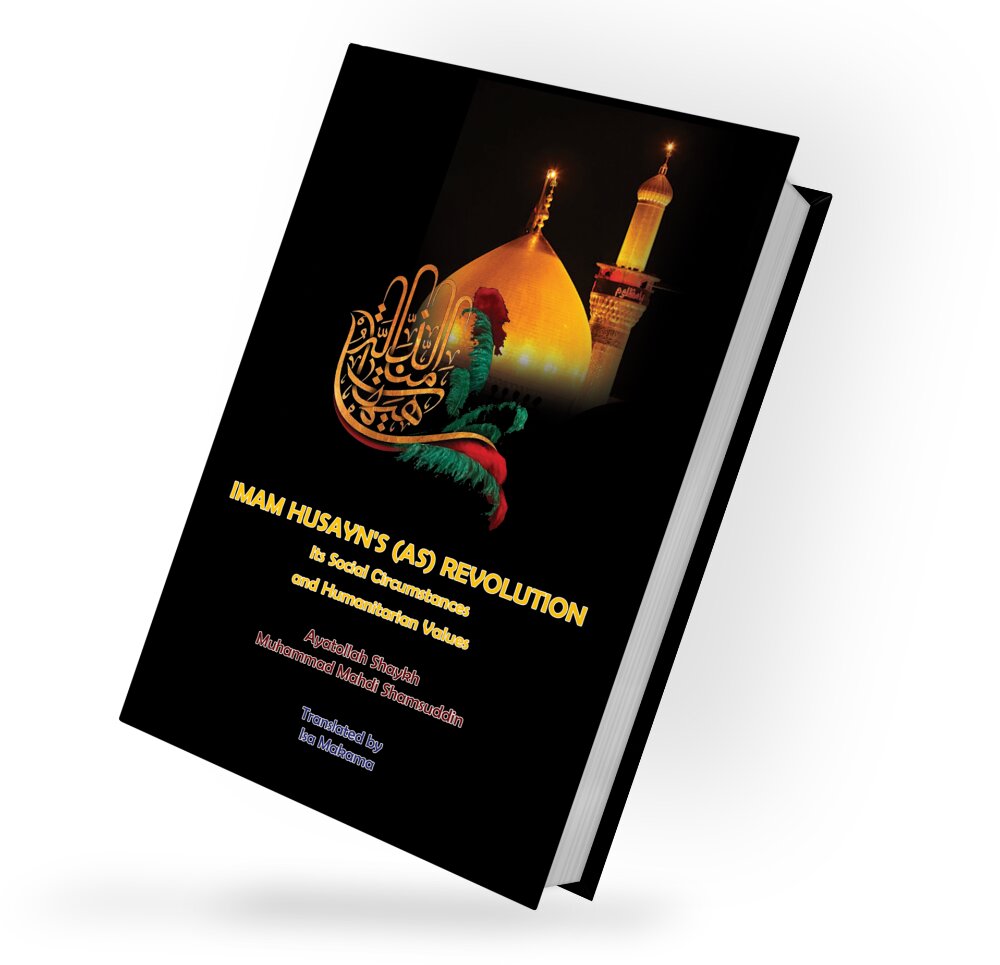
The book “Imam Hussain’s (a.s.) Revolution” is written by Sheikh Mohammad Mahdi Shamsuddin and has been translated by Issa Macaca in English in one volume and 162 pages. The AhlulBayt (a.s.) World Assembly Publications has published the book in medium octavo size and made it available to those who are interested.
“History of The Holy Quran”/ English
The book contains notes on some essential issues in the field of Quranic knowledge. To achieve his goal, the author has examined the subject in six chapters. In the first chapter, some introductory topics such as Revelation, cognition and the possibility of cognition are discussed. The reasons given for Revelation, especially prophecy Revelation, have also been criticized. In the second chapter, the period of the beginning of the Revelation of the Quran and the three-year break in the Revelation, and the period of the Revelation of the Quran and whether it was repulsive or gradual discussed. The third chapter also examines the order and compilation of the Quran, and the order of the verses. The fourth chapter deals with the reciters and the seven-kind recitations, and the fifth chapter deals with the issue of the distortion of the Quran. Regarding the translation of the Quran, including the method of translation, the fatwas of Shiite and Sunni jurists, the history of translation in Islam, and some examples of translations of the Quran are also presented in the sixth and final chapter.

The book “The History of The Holy Quran” is written by late Sheikh Mohammad Hadi Maarefat (r.a.) and has been translated by Agha Alireza Razavi in English in one volume and 307 pages. The AhlulBayt (a.s.) World Assembly Publications has published the book in medium octavo size and made it available to those who are interested.
“Differences among Muslim Jurists Concerning the Prophet’s Estate”/ English
From the jurisprudential point of view, this book examines the claim that it is forbidden for the divine prophets to leave an inheritance. The main essence of the book is the revelation of facts about the issue of Fadak, which the author considers as the undisputed right of the AhlulBayt (a.s.), and to deprive Lady Fatimah (a.s.) of it as treason and conspiracy against the Velayat of those nobles. The method that the researcher has followed in completing this research are enumerating the property inherited by the Prophet Muhammad (p.b.u.h), proving the illegitimacy of Abu Bakr and Umar’s behavior in depriving Lady Fatimah (a.s.) from owning Fadak, and mentioning the cases that indicate the contradictory behavior of the caliphs in other similar cases, the disputes of Imam Hanbal and Imam Shafi’i on the Abu Bakr’s decision about Fadak, and expressing the views of Shiite and Sunni scholars regarding the narration attributed to Abu Bakr.
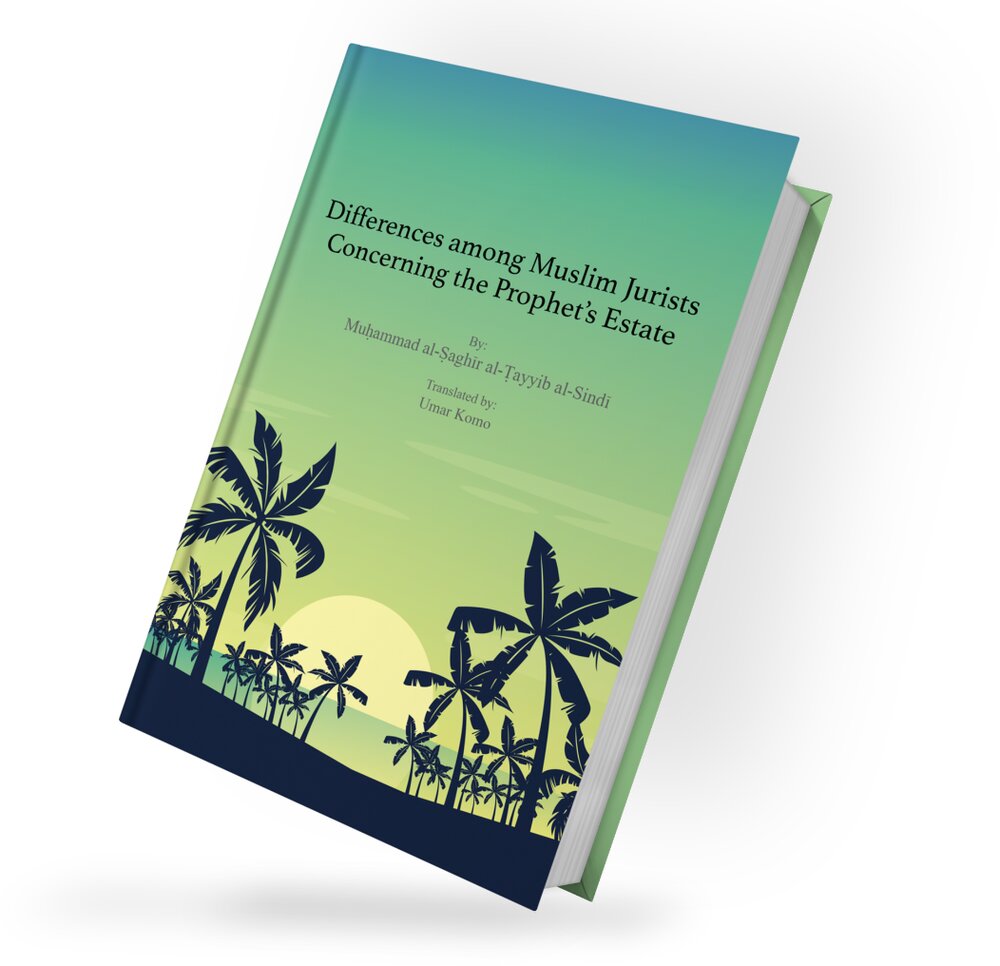
The book “Differences among Muslim Jurists Concerning the Prophet’s Estate” is written by Mr. Mohammad al-Saqir al-Tayyeb al-Sendi and has been translated by Mr. Umar Komo in English in one volume and 197 pages. The AhlulBayt (a.s.) World Assembly Publications has published the book in medium octavo size and made it available to those who are interested.
“The Farewell Pilgrimage”/ English
The book is a report on the way the Prophet Muhammad (p.b.u.h) performed the Hajj to achieve his monotheistic goals. In this work, the author has tried to introduce the rituals of Hajj approved by Islam with the help of the hadiths of the AhlulBayt (a.s.). The book begins with a detailed description of the Prophet Muhammad’s (p.b.u.h) rituals during the Hajj, which occupies a significant part of the book. In the next section, various stops are introduced during the Hajj, and the words of the Prophet while attending those places are presented. In the following, two authentic hadiths are compared, quoting Muawiyah ibn Ammar from the Shiites, and Jabir ibn Abdullah Ansari from the Sunnis. The author has stated that since Jabir received his narration from Imam Muhammad Baqer (a.s.), the differences between Shiites and Sunnis regarding the rituals of Hajj are very small. Among the final topics of the book are the main features of Hajj in the time of Jahiliya, the number of Hajj and Umrahs of the Prophet Muhammad (p.b.u.h) during his blessed life, Hadiths from the Infallible Imams (a.s.) about Hajj, the concern of Shiites and Shiite Ulama towards Hajj, and notes about the Orayyez region.
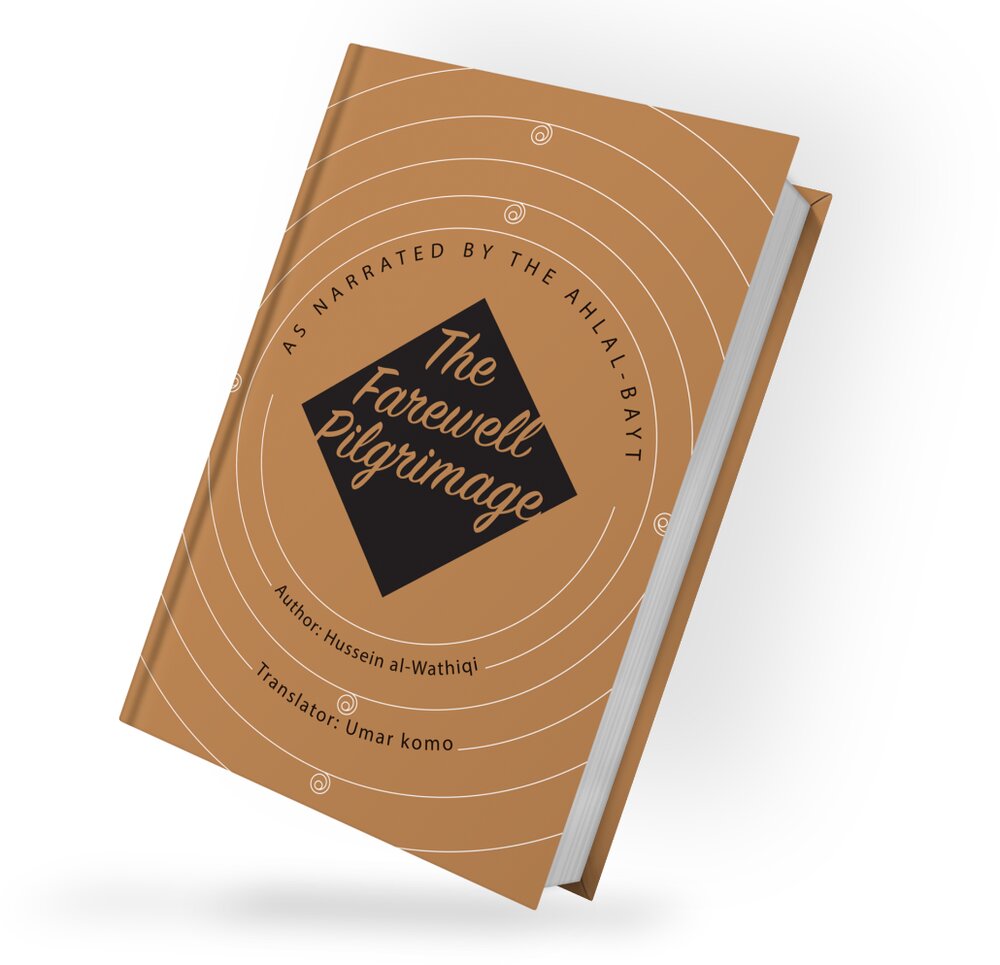
The book “The Farewell Pilgrimage” is written by Mr. Hussain Al-Wathiqi and has been translated by Mr. Umar Kumo in English in one volume and 440 pages. The AhlulBayt (a.s.) World Assembly Publications has published the book in medium octavo size and made it available to those who are interested.
“Relations between the Caliphs & the AhlulBayt (a.s.)”/ English
The book examines the dimensions and aspects of Imam Ali’s (a.s.) political relationship with the three caliphs, based on Shiite and Sunni sources. Due to benevolence, consultations, family ties and naming of children after the names of caliphs by Imam Ali (a.s.), and his avoidance of any dispute with them, there is a suspicion that the Caliphate of the Caliphs was legitimate. Therefore, in his book the author has tried to explain the legitimacy of the undisputed caliphate and succession of Imam Ali (a.s.) after the Prophet Muhammad (p.b.u.h) and the reasons for his relations with the companions of the Prophet, the caliphs, and their families. The result of the reviewing the author’s thought indicates that based upon reasons from the Quran and authentic Hadiths from Shiite and Sunni sources, the undisputed caliphate of Imam Ali (a.s.) is definite, and referring to some behaviors, which may have been done with different motives, cannot create any ambiguity in this matter and be a proof of the legitimacy of the successor of the Prophet by the caliphs.

The book “Relations between the Caliphs & the AhlulBayt (a.s.)” is written by Mr. Reza Kardan Salmani and has been translated by Mr. Mohsen Dehqani Taftani in English in one volume and 86 pages. The AhlulBayt (a.s.) World Assembly Publications has published the book in crown octavo size and made it available to those who are interested.
“The Role of Taqlid in Human Life”/ English
The book explains the place and necessity of Taqlid (emulation) and its different domains. The book is the result of Ayatollah Mesbah Yazdi’s lectures on the subject in the last ten days of Ramadan 2004 in Qom. He begins with explanations about the positions and duties of the Prophet (p.b.u.h) and the infallible Imams (a.s.), and after examining the truth of Taqlid and its status and necessity, and reconsidering the motives of Taqlid and following others, he has examined the possibility and necessity of the obedience of the Infallibles (a.s.). He considers questioning the belief of Taqlid as one of the methods of skepticism in religion with the aim of de-religionizing and doubting. Other topics of the book are the study of the areas of adherence to reason and revelation and the explanation of the attitude of Islam and liberalism to traditions, beliefs, and values, as well as a critique of the theory of instability of laws and rules. In the end, the issue of confronting the front of hypocrisy and infidelity against the right front has been examined.
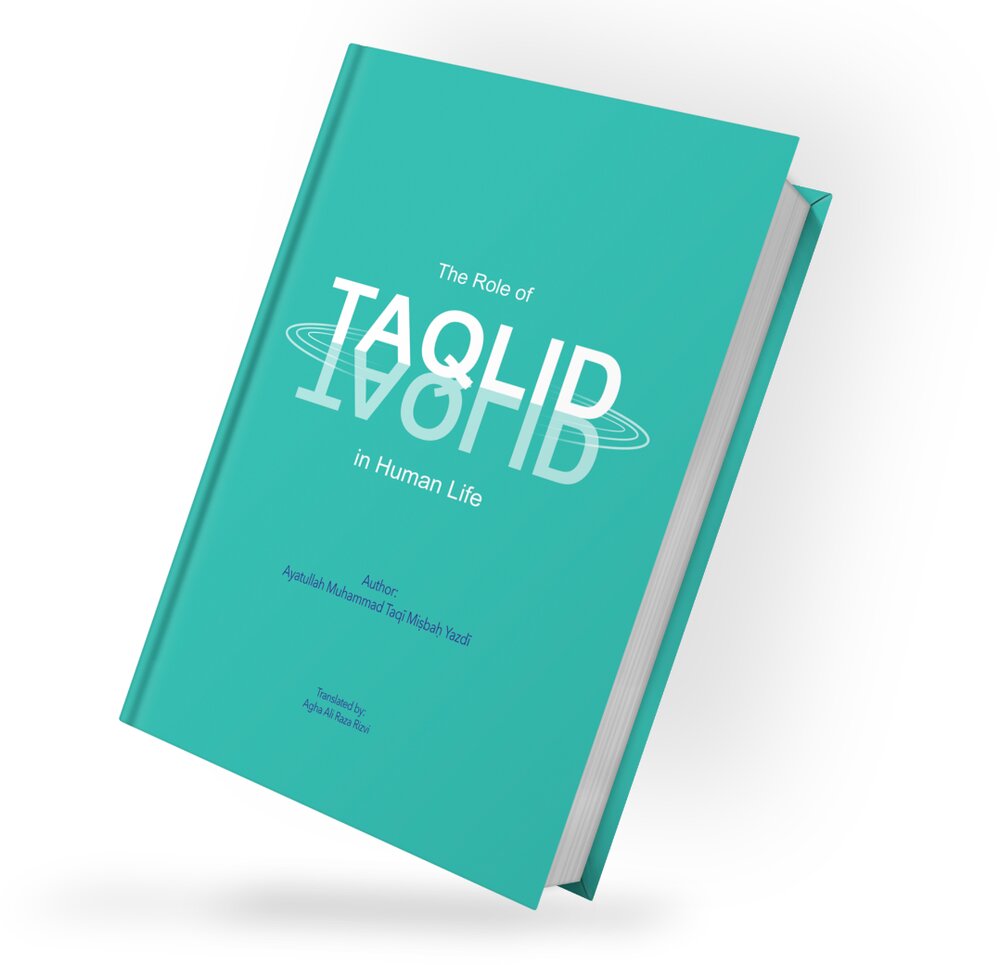
The book “The Role of Taqlid in Human Life” is written by late Ayatollah Mohammad Taqi Mesbah Yazdi (r.a.) and has been translated by Mr. Alireza Razavi in English in one volume and 273 pages. The AhlulBayt (a.s.) World Assembly Publications has published the book in medium octavo size and made it available to those who are interested.
“Revelation in Divine Religions”/ English
The book deals with the understanding of the reality of revelation. The author believes that revelation was not a natural phenomenon, and therefore cannot be understood by scientific and experimental tools. In his book, the author has sought to provide clues to the understanding the revelation by researching narrative and intellectual texts. The book begins with a recognition of the meanings of revelation in the Holy Quran. Then explanations are given about the literal meaning of revelation and the truth of God’s words. The revelation of the Quran and its quality, as well as the study of the views of the Quran and Islamic philosophers on revelation have also been discussed in the book. In the last section, the author explains the belief in revelation from the perspective of Christianity and Judaism and its adaption to the Quranic teachings and explains the differences between revelation and reason and how they interact with each other.
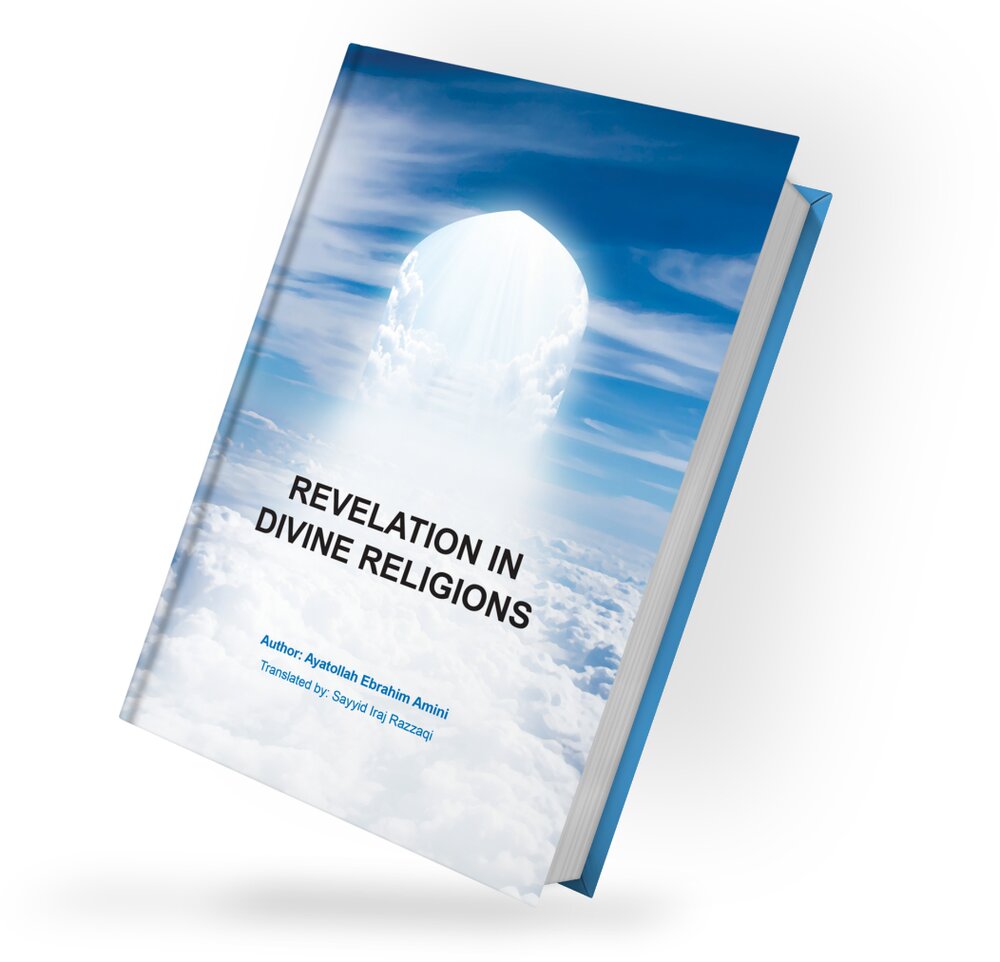
The book “The Role of Taqlid in Human Life” is written by late Ayatollah Ebrahim Amini (r.a.) and has been translated by Mr. Sayed Iraj Razzaqi in English in one volume and 240 pages. The AhlulBayt (a.s.) World Assembly Publications has published the book in crown octavo size and made it available to those who are interested.
“Wahabis”/ English
The book deals with the history and beliefs of the Wahhabi sect. The book first provides brief information on how Wahhabism was founded and a summary of the biographies of its founders. The next contents of the book are the explanation of Ibn Taymiyyah’s beliefs in the fields of Tawhid (monotheism), the breadth of the circle of Shirk (polytheism), seeing God, the infallibility of the prophets, going on the pilgrimage of the shrine of the Prophet (p.b.u.h), swearing to someone other than God, traveling to go on the pilgrimage of graves, Shiites, building monuments on graves, Prayer and supplication and appeal to the Prophet Muhammad (p.b.u.h). Then in the book, the biography of Muhammad bin Abdul Wahab is presented. In the next section, some of the Wahhabi beliefs are followed by explanations on the topics such as the oldest mention of Wahhabi sect and their beliefs in Iranian sources, the land of Najd, the crimes of Al-Saud, the Brotherhood, the spread of Wahhabism outside Saudi Arabia, including India, Sudan, Sumatra, Egypt, and Morocco.

The book “Wahabis” is written by Mr. Sayed Iraj Razzaqi and has been translated by Sayedeh Zahra Mousavi Khalkhali in English in one volume and 425 pages. The AhlulBayt (a.s.) World Assembly Publications has published the book in medium octavo size and made it available to those who are interested.
“A Logical Analysis of Wahhabi Beliefs”/ English
This book deals with the history, thoughts, and beliefs of Wahhabism. In this book, which is a translation of the book “Rawafid al-Iman Ila al-Aqeed al-Islam”, some Wahhabi claims and beliefs about some Islamic issues are discussed. Regarding each issue raised in this book, first the main belief is explained and then its deviant version from the perspective of other Islamic beliefs is discussed. Then there are examples of the actions of Muslims, companions, and fatwas of jurists of Islamic denominations, contrary to what the Wahhabis believe. Some of the main topics of the book are intercession, seeking blessing from the graves, supplication and seeking needs, reconstruction of graves and building a dome over it, Nazr (pledging to do some good deed such as giving alms if one achieves his wish), swearing to someone other than God, celebrating birth anniversaries of the great figures such as Prophet and Imams, crying over the dead and holding mourning ceremonies and going on the pilgrimage of the graves.
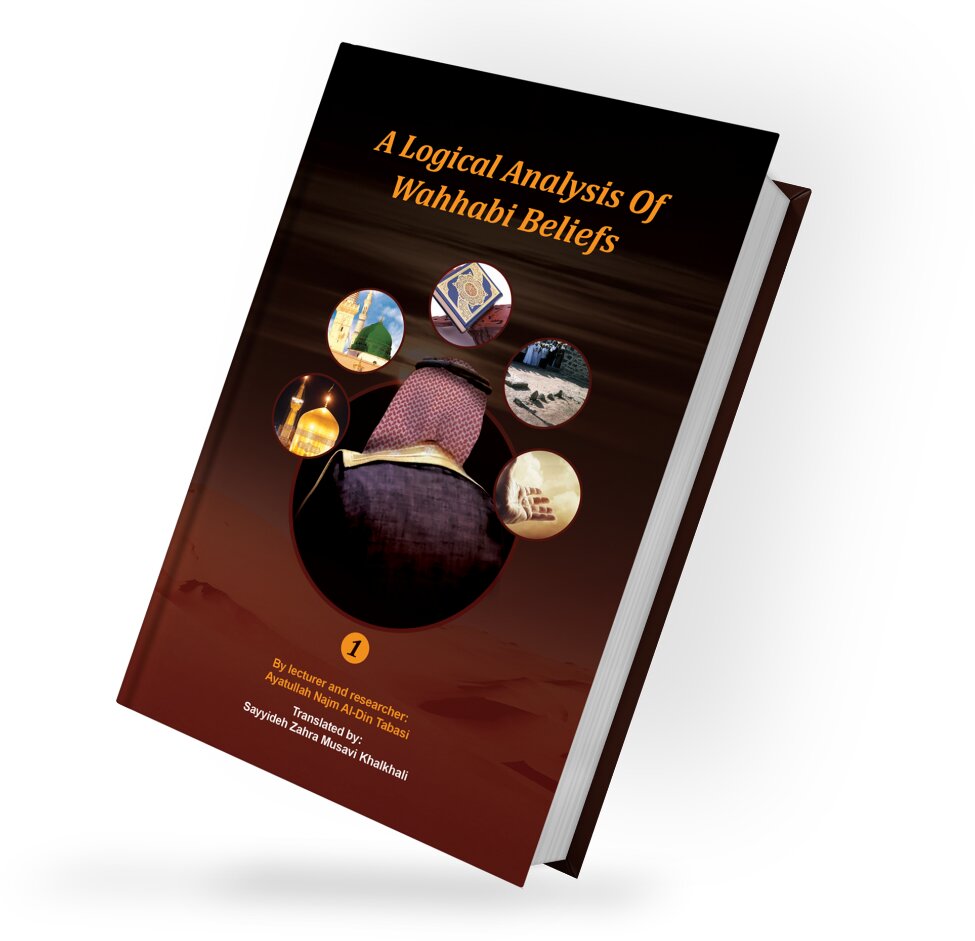
The book “Rawafid al-Iman Ila al-Aqeed al-Islam” is written by Mr. Najmeddin Tabasi and has been translated by Sayedeh Zahra Mousavi Khalkhali in English in three volumes and 433 pages. The AhlulBayt (a.s.) World Assembly Publications has published the book in crown octavo size and made it available to those who are interested.
Those who interested to buy the books in person, can refer to AhlulBayt (a.s.) World Assembly, Jomhuri Islami Boulevard, Qom, Iran; or call the number: +982532131307
One of the activities of the AhlulBayt (a.s.) World Assembly is the translation of authentic books into various languages. In this article we introduce some of these books.
One of the activities of the AhlulBayt (a.s.) World Assembly is the translation of authentic books into various languages. In this article we introduce some of these books.
“The Role of Imams (a.s.) in Reviving Religion”/ Azeri
In this book, the author examines the principles governing the practice of the Infallible Imams (a.s.) in reviving true Islam and protecting the tradition of the Prophet Muhamad (p.b.u.h). This book is the result of a series of lectures by the author on the subject, which is organized in the form of forty-four lessons. In this book, the author has tried to look meticulously at the following topics and issues with the method of analytical biography: introduction and comparison of the school of caliphs and AhlulBayt (a.s.), explanation of some Islamic terms, a brief overview of the tradition of the Prophet Muhammad (p.b.u.h) and its situation during the caliphs, correction of religious beliefs about knowing Imams (a.s.), a description of the history of Islamic thought in past centuries and the expression of making distortions and hadiths, expressing false virtues and actions of the hypocritical enemies of Islam and Shiism. According to him, the greatest role of Shiite Imams has been to protect the Islam from distortion and to tell the truth to the Islamic Ummah.

The book “The Role of Imams (a.s.) in Reviving Religion” by Allameh Sayed Morteza Askari (r.a.), is translated by Mr. Reza Şükrəf into Azeri in 493 pages and single volume. The AhlulBayt (a.s.) World Assembly Publications has published this book in medium octavo size and made it available to those who are interested.
“Charter of Statesmanship by Imam Ali (a.s.)”/ English
This book is a description and explanation on the Imam Ali (a.s.) command to Malik Ashtar. This command was given to Malik Ashtar by Imam Ali (a.s.) when Malik was dispatched to take the rule of Egypt and contains recommendations and instructions for Islamic governance. The author intends to carefully explain the Islamic view in the field of government and governance in the various passages of this letter. At the beginning of the book, there are articles about the author. Then there are discussions about the character of Malik Ashtar, and the importance of the Egyptian government in the beginning of Islam. Then, the different phrases of the command, one by one, are discussed and the necessary explanations are provided about them. The different parts of the book emphasized the observance of piety, the need to pay attention to Islamic ethics and teachings for the ruler, the observance of fairness and justice in dealing with the people, the importance of fighting oppression, advice to the government and expressing the methods of managing state and military forces.

The book “Charter of Statesmanship by Imam Ali (a.s.)” by Ayatollah Mohammad Fazel Lankarani (r.a.), has been translated by Mr. Mohsen Dehghani Taftani in English in one volume and 220 pages. The AhlulBayt (a.s.) World Assembly Publications has published this book in crown octavo and made it available to those who are interested.
“The Verse of Purification”/ English
This book is an analysis of historical events after the demise of the Prophet Muhammad (p.b.u.h) based on the Verse of Purification. The author has considered the 33rd verse of Surah Al-Ahzab as the most important document for judging many Islamic intellectual and cultural issues. According to him, by referring to this noble verse and scrutinizing it, one can recognize the main line of thought of Islam in its principles and sub-principles. By studying the Prophetic tradition and some other verses of the Quran, such as the Verse of Ikmal al-Din (Q5:3), he has thematically studied the AhlulBayt (a.s.), and has raised the following as a result of his discussions: Indisputable Caliphate and Imamate of Imam Ali (a.s.), Continuation of Imamate in Infallible Imams (a.s.), and the authenticity of the hadiths of those nobles. In the end, he has studied the Verse of Purification in the books of Kutub Sehah al-Sittah, Musnads and Sunni Tafsir books.

The book “Verse of Purification” is written by late Ayatollah Mohammad Mahdi Asefi (r.a.) and has been translated by Mr. Abdullah Ahmad Zango in English in one volume and 204 pages. The AhlulBayt (a.s.) World Assembly Publications has published the book in medium crown size and made it available to those who are interested.
“An Acquaintance with Islam”/ English
This book, which has been written with the motive of brief introduction of Islamic beliefs in various fields, using Quranic teachings and narration, provides explanations for topics such as: Islamic Principles (Osul al-Din), Ethics in the view of Islam, Faith and man from the perspective of Islam, Duties (Taklif) and rulings (Ahkam) and their sources, and finally, the sub-principles of Islam (Foru al-Din). In the light of these issues, the author refers to and explains topics such as: The role of beliefs in human felicity, The position of the Velayat in Islam, Ethical methods, Prayer and worship in Islam, Infidelity (Kufr) and hypocrisy (Nifq), Unity (Wahdah), Free will and Determinism, Human responsibilities, Prayer, Fasting, Hajj, Jihad, Enjoining the good and forbidding the evil, Zakat and Khums.

The book “An Acquaintance with Islam” is written by late Ayatollah Ebrahim Amini (r.a.) and has been translated by Mr. Mahmoud Farokhpey in English in one volume and 244 pages. The AhlulBayt (a.s.) World Assembly Publications has published the book in crown octavo size and made it available to those who are interested.
“Arbaeen”/ English
In the book, after a brief introduction, the author examines topics such as: The place and use of the number 40 in religious culture and texts, Dedicating Arbaeen pilgrimage to Imam Hussain (a.s.), Arbaeen pilgrimage, a sign of being a believer, Captives of Karbala, Arbaeen pilgrimage throughout history, Topics related to Arbaeen in contemporary Iran, The importance of the pilgrimage of Imam Hussain (a.s.) in the words of the Infallibles (a.s.), and Philosophy of pilgrimage, etc.

The book “Arbaeen” is written by Mr. Ali Dejakam and has been translated by Mr. Mansour Limba and Ms. Gil Dayan in English in one volume and 144 pages. The AhlulBayt (a.s.) World Assembly Publications has published the book in crown octavo size and made it available to those who are interested.
“The Appropriate Way to Await the Twelfth Imam”/ English
This book has a look at the semantics of the word Awaiting in the Quranic verses and the hadiths of the Infallibles (a.s.). It begins with a narrative and historical look at the concept of Awaiting. Then, by proposing types of Awaiting, the author praises an Awaiting that causes one to strive to achieve a goal. He does not consider an Awaiting that only gives hope and desire, and does not lead to move, a religious Awaiting. In the following, he examines and analyzes the various reasons that delay the Reappearance (of Imam Mahdi a.s.). Then, the various groups mentioned in the hadiths as the people who pave the way for the Reappearance will be introduced. In the concluding section of his book, the author states that there is a close connection between effort and the issue of Awaiting; in such a way that each causes an increase in the other.

The book “The Appropriate Way to Await the Twelfth Imam” is written by late Ayatollah Mohammad Mahdi Asefi (r.a.) and has been translated by Mr. Shiraz Hossein Agha in English in one volume and 144 pages. The AhlulBayt (a.s.) World Assembly Publications has published the book in crown octavo size and made it available to those who are interested.
“A Study of the Fundamental Themes of Imamate”/ English
This book has four chapters in which the necessity of existence, conditions, attributes, and quality of choosing an Imam are examined: In the first chapter, issues such as: the definition of Imamate, the origin of Shiism, Imamate in the Quran, Ulol al-Amr, and the Wali al-Amr, in Hadiths are examined. In the second chapter, the specific prophecy argument (Borhan al-Nobowah al-Khasah), and the rational and narrative reasons of Imamate are discussed. In the third chapter, the reasons for the Imam’s infallibility from the points of views of intellect, hadith, and the Quran (study of the verse of purification) have been scrutinized. In the fourth chapter, the subject of Imam’s knowledge is explored, in which the following topics are examined: knowledge of the Ahkam, sources of knowledge of Imams (a.s.), difference between Imam and Prophet, knowledge of the unseen, news of Imams (a.s.) of the unseen, limits of knowledge of the unseen, the miracle, the superiority of the Imam, and the way he was chosen.

The book “A Study of the Fundamental Themes of Imamate” is written by late Ayatollah Ebrahim Amini (r.a.) and has been translated by Mr. Kelvin Lembani in English in one volume and 413 pages. The AhlulBayt (a.s.) World Assembly Publications has published the book in crown octavo size and made it available to those who are interested.
“A Short Treatise on the Life of Imam Ali (a.s.)”/ English
The book tries to introduce the personality of Imam Ali (a.s.) by examining the views of this Imam (a.s.) on topics such as politics, jihad, mysticism, and death. According to the author, the study of the personality of Imam Ali (a.s.) should be based on understanding the roots of thought and the real motives of that Imam. He considered Imam Ali (a.s.) as a politician who believed that securing the interests of society and the interests of individuals is feasible through the spread of Islamic knowledge, and always tried to rule obedience to God and the observance of human values in all aspects of his personal and social life. The author also criticizes the attitude of some Islamic scholars and Western Islamologists to the mentioned issues and intends to provide a clearer picture of Imam Ali’s (a.s.) thought. Also, in an article in this book, the validity of citing Nahj al-Balagha to the words of Imam Ali (a.s.) is discussed.

The book “A Short Treatise on the Life of Imam Ali (a.s.)” is written by late Allameh Mohammad Taqi Jafari (r.a.) and has been translated by Mr. Kazem Bujani in English in one volume and 138 pages. The AhlulBayt (a.s.) World Assembly Publications has published the book in crown octavo size and made it available to those who are interested.
“Fragrances, A biography of the Imams of the AhlulBayt (a.s.)”/ English
The book describes some of the attributes and virtues of the Infallible Imams (a.s.). In each of the twelve chapters of the book, the author has examined the personal characteristics, moral virtues, and social life of one of the Imams (a.s.). The author describes those nobles as exemplary and unique human beings and considers all of them to have the attributes of selflessness, self-sacrifice, asceticism, humility, helping the poor and weak in society, and disseminating sciences and knowledge. The birth, titles, moral virtues, social services, wise words, and the manner of martyrdom of each of the Imams (a.s.) are also stated in this book. The author has presented the chapter related to Imam Ali (a.s.) in detail, and in it, he mentions the era of Imamate of Imam Ali (a.s.), his position with the Prophet Muhammad (p.b.u.h), his status in the Resurrection, and his positive effects on progress of the mission of Prophet Muhammad (p.b.u.h).

The book “Fragrances, A biography of the Imams of the AhlulBayt (a.s.)” is written by late Allameh Baqer Sharif Al-Qarashi (r.a.) and has been translated by Mr. Abdullah Ahmad Zango in English in one volume and 374 pages. The AhlulBayt (a.s.) World Assembly Publications has published the book in crown octavo size and made it available to those who are interested.
“The Saqifah Conspiracy”/ English
In his book, the author analyzes and explains the Muslim dispute over the succession of the Prophet Muhammad (p.b.u.h) after his demise, and briefly reviews the events of the beginning of Islam. In this book, the general atmosphere of the origin of Islam among the Quraysh tribe, Hejaz region, is first described, and the main enemies of Islam are introduced. The position of the Caliphate in Islam is the first issue that the author has addressed, and he has considered the Caliphate as one of the necessities of Islam and emphasized by the Prophet Muhammad (p.b.u.h). Also in this section, the author has discussed the issue of appointing Imam Ali (a.s.) as a successor by the Prophet Muhammad (p.b.u.h). Next, the book examined the caliphate in the Quran and Sunnah. The great support of the Prophet Muhammad (p.b.u.h) about the succession of Imam Ali (a.s.), and the confrontation with the dangers that will befall the Islamic Ummah in the society after his demise, and references to the last days of the life of the Prophet Muhammad (p.b.u.h) are the next contents of the book. The book concludes with a detailed account of the Saqifah incident and examines the role and performance of proponents and opponents, as well as a look at its consequences.

The book “The Saqifah Conspiracy” is written by late Allameh Baqer Sharif Al-Qarashi (r.a.) and has been translated by Mr. Badr Shahin in English in one volume and 240 pages. The AhlulBayt (a.s.) World Assembly Publications has published the book in medium octavo size and made it available to those who are interested.
“The Sun Rises in the West”/ English
The book contains notes about Imam Mahdi (a.s.) and examines the various dimensions and aspects of his Occultation. In this research, the author intends to express the lofty ideals in conveying religious truths, promoting proper education and establishing justice in all aspects of society. The book begins with a description of the birth and life of Imam Mahdi (a.s.). In the following, the issue of his Occultation is the focus of the discussion. In several chapters of the book, the truth of occultation in Islam and its background in other religions, and its implication according to the Quran, rational sciences and experimental sciences have been evaluated. Then, in a separate chapter, the educational and political philosophy of Islam is explored and components such as education, politics and guidance are considered as its main elements, and their relationship with the Occultation of the Imam is scrutinized. In the final part, the subject of Awaiting is discussed, and in it, the author tries to explain the duties of those who Await Imam Madi (a.s.).

The book “The Sun Rises in the West” is written by late Allameh Mohammad Reza Hakimi (r.a.) and has been translated by Mr. Mohammad Mahdi Baqi in English in one volume and 340 pages. The AhlulBayt (a.s.) World Assembly Publications has published the book in medium octavo size and made it available to those who are interested.
“The Expected Mahdi (a.s.)”/ English
The book, which is a study on the Mahdism Thought, has three general sections. The first part has three chapters and deals with the subject of recognizing Imam Mahdi (a.s.) and examining his characteristics. In this section, it is stated that understanding Imamate depends on understanding Nabowat (prophethood) and understanding Nabowat depends on understanding the truth of Tawhid (monotheism). Other topics in this section include explaining the true meaning of knowing the Imam, introducing the way of knowing the Imam Mahdi (a.s.), and identifying him as a perfect human being, and the caliph of God. The second part examines the issue of Awaiting and explains the truth of Awaiting and the duty of those who Await in four separate chapters. The third part, in two chapters, deals with the necessity of the Reappearance of Imam Mahdi (a.s.) and the general atmosphere of the world after his Reappearance, as well as the establishment of a Mahdavi utopia and the expression of its characteristics.

The book “The Expected Mahdi (a.s.)” is written by Ayatollah Javadi Amoli and has been translated by Mr. Mohmoud Farokhpey in English in one volume and 206 pages. The AhlulBayt (a.s.) World Assembly Publications has published the book in medium octavo size and made it available to those who are interested.
“Imam Ali ibn Abi Talib, the Successor of the Prophet”/ English
The book has an analytical review on the life history of Imam Ali (a.s.). From the author’s point of view, the different periods of the life of that great Imam are five significant periods, which are: from birth to the beginning of the prophethood of the Prophet Muhammad (p.b.u.h), from the beginning of the prophethood to Hijra (migration), from the migration to the demise of the Prophet Muhammad (p.b.u.h), from the demise of the Prophet (p.b.u.h) to the caliphate, and finally from the caliphate to martyrdom. The author acknowledges that in his book, he did not decide to introduce the personal character of Imam Ali (a.s.), but his main concern was to study the important events in the life of this Imam. The fifth and sixth parts of the work, which are the main parts of its topics, are dedicated to explaining the causes and factors of the events of the Imam Ali’s (a.s.) caliphate era, including: fighting seditions and coups, opponent social groups, establishing of the Umayyad government, wars, confronting some rebellious companions, governance, and martyrdom.

The book “Imam Ali ibn Abi Talib, the Successor of the Prophet” is written by Ayatollah Jafar Sobhani and has been translated by Mr. Sayed Hossein Alamdar in English in one volume and 504 pages. The AhlulBayt (a.s.) World Assembly Publications has published the book in medium octavo size and made it available to those who are interested.
“Virtues of the Five Persons, collected from, the Six Reliable Books”/ English
The book describes some of the virtues of the five people of Ahl al-Kisa. In this collection, with pondering six authentic Sunni hadith sources, the author has tried to present a clear picture of different angles and wide dimensions of spiritual positions, individual and social life, morals, and virtues of the Prophet Muhammad (p.b.u.h), Ali, Fatima, Hassan, and Hussain (a.s.) to his audience. During his discussions, he focuses on the virtues of those unique figures or their attributes, and explores various Sunni hadith sources about it, and points to their numerous examples and narrated differences. In the first part, the author describes the Prophet Muhammad (p.b.u.h) and Imam Ali (a.s.), and in the next part, the high position of Imam Ali (a.s.) in the eyes of the Prophet (p.b.u.h), and in the final part, he expressed the virtues of other five people of Ahl al-Kisa.

The book “Virtues of the Five Persons, collected from, the Six Reliable Books” is written by Mr. Morteza Hosseini Yazdi Firousabadi, and has been translated by Mr. Badr Shahin in English in one volume and 523 pages. The AhlulBayt (a.s.) World Assembly Publications has published the book in medium octavo size and made it available to those who are interested.
“Paradoxes of Whhabism”/ English
This book has criticized the ideas and thoughts of Wahhabism and responds to the suspicions raised by them against the Shiites. The author has tried to explain the Islamic point of view with a Quranic and hadithic approach in cases that contradict the beliefs and ideas of Wahhabism and other Islamic denominations. To achieve this goal, he has organized the contents of the book into two general sections. In the first part, the issue of Tawhid (monotheism) and Shirk (polytheism) is the basis of the discussion. In addition, it has dealt with issues such as: types of Tawhid and Shirk, the importance of Tawhid in worship, permission to go on pilgrimage of the shrine of the Prophet Muhammad (p.b.u.h) and travel for this pilgrimage, permission to go on the pilgrimage of the graves of believers even for women, permission to hold celebrations and mourning for great Islamic figures. In the second part, the subject of distortion of the Quran has been the focus of discussions and in it, the meaning of distortion, its types, explaining the views of Shiite and Sunni figures about it and some reasons to reject the idea of distortion of the Quran are given.

The book “Paradoxes of Whhabism” is written by late Ayatollah Taheri Khorramabadi (r.a.) and has been translated by Zeinab Mohammadi Araqi in English in one volume and 453 pages. The AhlulBayt (a.s.) World Assembly Publications has published the book in medium octavo size and made it available to those who are interested.
“Imam Hussain’s (a.s.) Revolution”/ English
The book has described and analyzed the movement of Imam Hussain (a.s.) from different aspects. According to the author, re-studying the Karbala revolution and understanding the character of Imam Hussain (a.s.) reveals large parts of the background and nature of true Islam. Therefore, in his book, the author has tried to achieve his goal by examining the political and social contexts of this uprising, and searching for the causes of this historical event, as well as following its effects and consequences. According to the findings of this study, among the main contexts of the Karbala uprising were the Saqifah incident, the belief in the council in appointing a successor for the Prophet Muhammad (p.b.u.h) after his demise, the creation of a class system by the second caliph, incorrect financial and managerial methods of the third caliph, intolerance of Imam Ali’s (a.s.) reforms by the people, and Muawiyah’s policy in spreading poverty and fear in society. According to the author, the effects of the Imam Hussain’s (a.s.) uprising are considered to be the breaking of religious frameworks, a deeper understanding of sins, the spread of new morals in society, creating a spirit of fighting oppression in the people and the emergence of various uprisings against the oppressive system.

The book “Imam Hussain’s (a.s.) Revolution” is written by Sheikh Mohammad Mahdi Shamsuddin and has been translated by Issa Macaca in English in one volume and 162 pages. The AhlulBayt (a.s.) World Assembly Publications has published the book in medium octavo size and made it available to those who are interested.
“History of The Holy Quran”/ English
The book contains notes on some essential issues in the field of Quranic knowledge. To achieve his goal, the author has examined the subject in six chapters. In the first chapter, some introductory topics such as Revelation, cognition and the possibility of cognition are discussed. The reasons given for Revelation, especially prophecy Revelation, have also been criticized. In the second chapter, the period of the beginning of the Revelation of the Quran and the three-year break in the Revelation, and the period of the Revelation of the Quran and whether it was repulsive or gradual discussed. The third chapter also examines the order and compilation of the Quran, and the order of the verses. The fourth chapter deals with the reciters and the seven-kind recitations, and the fifth chapter deals with the issue of the distortion of the Quran. Regarding the translation of the Quran, including the method of translation, the fatwas of Shiite and Sunni jurists, the history of translation in Islam, and some examples of translations of the Quran are also presented in the sixth and final chapter.

The book “The History of The Holy Quran” is written by late Sheikh Mohammad Hadi Maarefat (r.a.) and has been translated by Agha Alireza Razavi in English in one volume and 307 pages. The AhlulBayt (a.s.) World Assembly Publications has published the book in medium octavo size and made it available to those who are interested.
“Differences among Muslim Jurists Concerning the Prophet’s Estate”/ English
From the jurisprudential point of view, this book examines the claim that it is forbidden for the divine prophets to leave an inheritance. The main essence of the book is the revelation of facts about the issue of Fadak, which the author considers as the undisputed right of the AhlulBayt (a.s.), and to deprive Lady Fatimah (a.s.) of it as treason and conspiracy against the Velayat of those nobles. The method that the researcher has followed in completing this research are enumerating the property inherited by the Prophet Muhammad (p.b.u.h), proving the illegitimacy of Abu Bakr and Umar’s behavior in depriving Lady Fatimah (a.s.) from owning Fadak, and mentioning the cases that indicate the contradictory behavior of the caliphs in other similar cases, the disputes of Imam Hanbal and Imam Shafi’i on the Abu Bakr’s decision about Fadak, and expressing the views of Shiite and Sunni scholars regarding the narration attributed to Abu Bakr.

The book “Differences among Muslim Jurists Concerning the Prophet’s Estate” is written by Mr. Mohammad al-Saqir al-Tayyeb al-Sendi and has been translated by Mr. Umar Komo in English in one volume and 197 pages. The AhlulBayt (a.s.) World Assembly Publications has published the book in medium octavo size and made it available to those who are interested.
“The Farewell Pilgrimage”/ English
The book is a report on the way the Prophet Muhammad (p.b.u.h) performed the Hajj to achieve his monotheistic goals. In this work, the author has tried to introduce the rituals of Hajj approved by Islam with the help of the hadiths of the AhlulBayt (a.s.). The book begins with a detailed description of the Prophet Muhammad’s (p.b.u.h) rituals during the Hajj, which occupies a significant part of the book. In the next section, various stops are introduced during the Hajj, and the words of the Prophet while attending those places are presented. In the following, two authentic hadiths are compared, quoting Muawiyah ibn Ammar from the Shiites, and Jabir ibn Abdullah Ansari from the Sunnis. The author has stated that since Jabir received his narration from Imam Muhammad Baqer (a.s.), the differences between Shiites and Sunnis regarding the rituals of Hajj are very small. Among the final topics of the book are the main features of Hajj in the time of Jahiliya, the number of Hajj and Umrahs of the Prophet Muhammad (p.b.u.h) during his blessed life, Hadiths from the Infallible Imams (a.s.) about Hajj, the concern of Shiites and Shiite Ulama towards Hajj, and notes about the Orayyez region.

The book “The Farewell Pilgrimage” is written by Mr. Hussain Al-Wathiqi and has been translated by Mr. Umar Kumo in English in one volume and 440 pages. The AhlulBayt (a.s.) World Assembly Publications has published the book in medium octavo size and made it available to those who are interested.
“Relations between the Caliphs & the AhlulBayt (a.s.)”/ English
The book examines the dimensions and aspects of Imam Ali’s (a.s.) political relationship with the three caliphs, based on Shiite and Sunni sources. Due to benevolence, consultations, family ties and naming of children after the names of caliphs by Imam Ali (a.s.), and his avoidance of any dispute with them, there is a suspicion that the Caliphate of the Caliphs was legitimate. Therefore, in his book the author has tried to explain the legitimacy of the undisputed caliphate and succession of Imam Ali (a.s.) after the Prophet Muhammad (p.b.u.h) and the reasons for his relations with the companions of the Prophet, the caliphs, and their families. The result of the reviewing the author’s thought indicates that based upon reasons from the Quran and authentic Hadiths from Shiite and Sunni sources, the undisputed caliphate of Imam Ali (a.s.) is definite, and referring to some behaviors, which may have been done with different motives, cannot create any ambiguity in this matter and be a proof of the legitimacy of the successor of the Prophet by the caliphs.

The book “Relations between the Caliphs & the AhlulBayt (a.s.)” is written by Mr. Reza Kardan Salmani and has been translated by Mr. Mohsen Dehqani Taftani in English in one volume and 86 pages. The AhlulBayt (a.s.) World Assembly Publications has published the book in crown octavo size and made it available to those who are interested.
“The Role of Taqlid in Human Life”/ English
The book explains the place and necessity of Taqlid (emulation) and its different domains. The book is the result of Ayatollah Mesbah Yazdi’s lectures on the subject in the last ten days of Ramadan 2004 in Qom. He begins with explanations about the positions and duties of the Prophet (p.b.u.h) and the infallible Imams (a.s.), and after examining the truth of Taqlid and its status and necessity, and reconsidering the motives of Taqlid and following others, he has examined the possibility and necessity of the obedience of the Infallibles (a.s.). He considers questioning the belief of Taqlid as one of the methods of skepticism in religion with the aim of de-religionizing and doubting. Other topics of the book are the study of the areas of adherence to reason and revelation and the explanation of the attitude of Islam and liberalism to traditions, beliefs, and values, as well as a critique of the theory of instability of laws and rules. In the end, the issue of confronting the front of hypocrisy and infidelity against the right front has been examined.

The book “The Role of Taqlid in Human Life” is written by late Ayatollah Mohammad Taqi Mesbah Yazdi (r.a.) and has been translated by Mr. Alireza Razavi in English in one volume and 273 pages. The AhlulBayt (a.s.) World Assembly Publications has published the book in medium octavo size and made it available to those who are interested.
“Revelation in Divine Religions”/ English
The book deals with the understanding of the reality of revelation. The author believes that revelation was not a natural phenomenon, and therefore cannot be understood by scientific and experimental tools. In his book, the author has sought to provide clues to the understanding the revelation by researching narrative and intellectual texts. The book begins with a recognition of the meanings of revelation in the Holy Quran. Then explanations are given about the literal meaning of revelation and the truth of God’s words. The revelation of the Quran and its quality, as well as the study of the views of the Quran and Islamic philosophers on revelation have also been discussed in the book. In the last section, the author explains the belief in revelation from the perspective of Christianity and Judaism and its adaption to the Quranic teachings and explains the differences between revelation and reason and how they interact with each other.

The book “The Role of Taqlid in Human Life” is written by late Ayatollah Ebrahim Amini (r.a.) and has been translated by Mr. Sayed Iraj Razzaqi in English in one volume and 240 pages. The AhlulBayt (a.s.) World Assembly Publications has published the book in crown octavo size and made it available to those who are interested.
“Wahabis”/ English
The book deals with the history and beliefs of the Wahhabi sect. The book first provides brief information on how Wahhabism was founded and a summary of the biographies of its founders. The next contents of the book are the explanation of Ibn Taymiyyah’s beliefs in the fields of Tawhid (monotheism), the breadth of the circle of Shirk (polytheism), seeing God, the infallibility of the prophets, going on the pilgrimage of the shrine of the Prophet (p.b.u.h), swearing to someone other than God, traveling to go on the pilgrimage of graves, Shiites, building monuments on graves, Prayer and supplication and appeal to the Prophet Muhammad (p.b.u.h). Then in the book, the biography of Muhammad bin Abdul Wahab is presented. In the next section, some of the Wahhabi beliefs are followed by explanations on the topics such as the oldest mention of Wahhabi sect and their beliefs in Iranian sources, the land of Najd, the crimes of Al-Saud, the Brotherhood, the spread of Wahhabism outside Saudi Arabia, including India, Sudan, Sumatra, Egypt, and Morocco.

The book “Wahabis” is written by Mr. Sayed Iraj Razzaqi and has been translated by Sayedeh Zahra Mousavi Khalkhali in English in one volume and 425 pages. The AhlulBayt (a.s.) World Assembly Publications has published the book in medium octavo size and made it available to those who are interested.
“A Logical Analysis of Wahhabi Beliefs”/ English
This book deals with the history, thoughts, and beliefs of Wahhabism. In this book, which is a translation of the book “Rawafid al-Iman Ila al-Aqeed al-Islam”, some Wahhabi claims and beliefs about some Islamic issues are discussed. Regarding each issue raised in this book, first the main belief is explained and then its deviant version from the perspective of other Islamic beliefs is discussed. Then there are examples of the actions of Muslims, companions, and fatwas of jurists of Islamic denominations, contrary to what the Wahhabis believe. Some of the main topics of the book are intercession, seeking blessing from the graves, supplication and seeking needs, reconstruction of graves and building a dome over it, Nazr (pledging to do some good deed such as giving alms if one achieves his wish), swearing to someone other than God, celebrating birth anniversaries of the great figures such as Prophet and Imams, crying over the dead and holding mourning ceremonies and going on the pilgrimage of the graves.

The book “Rawafid al-Iman Ila al-Aqeed al-Islam” is written by Mr. Najmeddin Tabasi and has been translated by Sayedeh Zahra Mousavi Khalkhali in English in three volumes and 433 pages. The AhlulBayt (a.s.) World Assembly Publications has published the book in crown octavo size and made it available to those who are interested.
Those who interested to buy the books in person, can refer to AhlulBayt (a.s.) World Assembly, Jomhuri Islami Boulevard, Qom, Iran; or call the number: +982532131307





